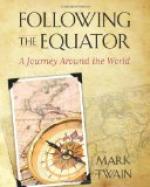If the ships all moved in the one direction—westward, I mean—the world would suffer a prodigious loss—in the matter of valuable time, through the dumping overboard on the Great Meridian of such multitudes of days by ships crews and passengers. But fortunately the ships do not all sail west, half of them sail east. So there is no real loss. These latter pick up all the discarded days and add them to the world’s stock again; and about as good as new, too; for of course the salt water preserves them.
CHAPTER V.
Noise proves nothing. Often a hen who has merely
laid an egg cackles as if she had laid an asteroid.
—Pudd’nhead
Wilson’s New Calendar.
Wednesday, Sept. 11. In this world we often make mistakes of judgment. We do not as a rule get out of them sound and whole, but sometimes we do. At dinner yesterday evening-present, a mixture of Scotch, English, American, Canadian, and Australasian folk—a discussion broke out about the pronunciation of certain Scottish words. This was private ground, and the non-Scotch nationalities, with one exception, discreetly kept still. But I am not discreet, and I took a hand. I didn’t know anything about the subject, but I took a hand just to have something to do. At that moment the word in dispute was the word three. One Scotchman was claiming that the peasantry of Scotland pronounced it three, his adversaries claimed that they didn’t—that they pronounced it ‘thraw’. The solitary Scot was having a sultry time of it, so I thought I would enrich him with my help. In my position I was necessarily quite impartial, and was equally as well and as ill equipped to fight on the one side as on the other. So I spoke up and said the peasantry pronounced the word three, not thraw. It was an error of judgment. There was a moment of astonished and ominous silence, then weather ensued. The storm rose and spread in a surprising way, and I was snowed under in a very few minutes. It was a bad defeat for me—a kind of Waterloo. It promised to remain so, and I wished I had had better sense than to enter upon such a forlorn enterprise. But just then I had a saving thought—at least a thought that offered a chance. While the storm was still raging, I made up a Scotch couplet, and then spoke up and said:
“Very well, don’t say any more. I confess defeat. I thought I knew, but I see my mistake. I was deceived by one of your Scotch poets.”
“A Scotch poet! O come! Name him.”
“Robert Burns.”
It is wonderful the power of that name. These men looked doubtful—but paralyzed, all the same. They were quite silent for a moment; then one of them said—with the reverence in his voice which is always present in a Scotchman’s tone when he utters the name.
“Does Robbie Burns say—what does he say?”
“This is what he says:




